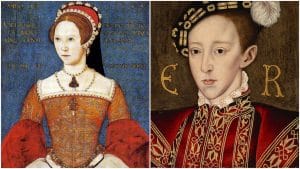 Two important Tudor “on this day in history” events took place on 20th February. On 20th February 1516, two-day-old Princess Mary, daughter of King Henry VIII and Catherine of Aragon, was baptised at the Church of the Observant Friars, Greenwich.
Two important Tudor “on this day in history” events took place on 20th February. On 20th February 1516, two-day-old Princess Mary, daughter of King Henry VIII and Catherine of Aragon, was baptised at the Church of the Observant Friars, Greenwich.
On 20th February 1516, two-day-old Princess Mary, daughter of King Henry VIII and Catherine of Aragon, was baptised at the Church of the Observant Friars, Greenwich.
Here is an excerpt from Letters and Papers based on an account of Mary’s christening the British Library’s Harley MS 3504 (folio 232):
“The Princess was born on Monday, 18 Feb. 1515, 7 Hen. VIII. at four in the morning, at Greenwich; christened on Wednesday next. From the court gate to the church door of the Friars was railed and hung with arras; the way being well gravelled and strewed with rushes. At the church door was set a house well framed of of timber, covered with arras, where the Princess, with her godfather and godmother, adobe. There she received her name Mary. Then they entered the church, which was hung with cloth of needlework garnished with precious stones and pearls. She was preceded by a goodly sight of gentlemen and lords. Then followed the bason, borne by my Lord of Devonshire, supported by Lord Herbert; the taper by the Earl of Surrey, the salt by the Marquis of Dorset, Lady Dorset bearing the chrism. The Lord Chamberlain followed, with the Lord Steward on his right. Then the canopy, borne by Sir David Owen, Sir Nich. Vaux, Sir Thos. Aparre, and Sir Thomas Boleyn, under which was the Princess, borne by the Countess of Surrey. The Princess was assisted by the Duke of Norfolk at the head, and the Duke of Suffolk at the feet. Next, the Lady Katharine, the Duchess of Norfolk, &c. The Lord Cardinal, godfather, Lady Katharine and the Duchess of Norfolk, godmothers, at the font. The Countess of Salisbury at the bishopping. Then Te Deum sung by the King’s chaplain. Order of returning to court described, in which Lord Burgevenny, the Archbps. of Armagh and Dublin, the Bps. of Durham and Chester, and the Earl of Derby, took part.”
Also on this day in history, 20th February 1547, Mary’s half-brother, nine-year-old Edward, was crowned king at Westminster Abbey by Archbishop Thomas Cranmer. Chronicler Charles Wriothesley recorded:
“The twentith daie of Februarie, being the Soundaie Quinquagesima, the Kinges Majestie Edward the Sixth, of the age of nyne yeares and three monthes, was crowned King of this realme of Englande, France, and Irelande, within the church of Westminster, with great honor and solemnitie, and a great feast keept that daie in Westminster Hall which was rychlie hanged, his Majestie sitting all dynner with his crowne on his head; and, after the second course served, Sir Edward Dymmocke, knight, came ridinge into the hall in clene white complete harneis, rychlie gilded, and his horse rychlie trapped, and cast his gauntlett to wage battell against all men that wold not take him for right King of this realme, and then the King dranke to him and gave him a cupp of golde; and after dynner the King made many knightes, and then he changed his apparell, and so rode from thence to Westminster Place.”
Edward was the son of King Henry VIII and Jane Seymour, and he was the first monarch to be anointed as Supreme Head of the English Church at his coronation.
Notes and Sources
- Letters and Papers, Foreign and Domestic, Henry VIII, Volume 2. 1573.
- Wriothesley, Charles (1875) A Chronicle of England During the Reigns of the Tudors from AD 1485-1559, Volume 1, p182-183.
